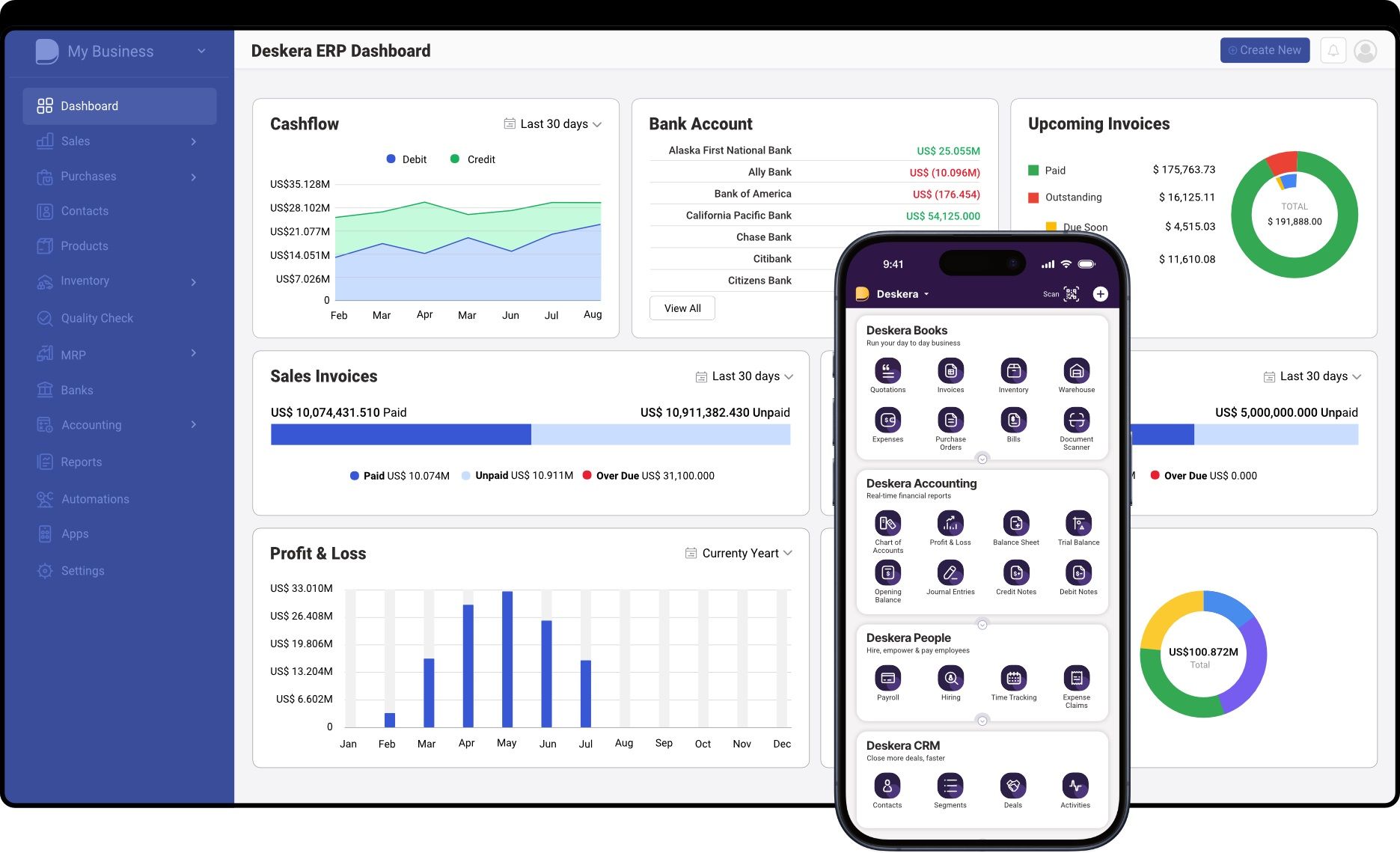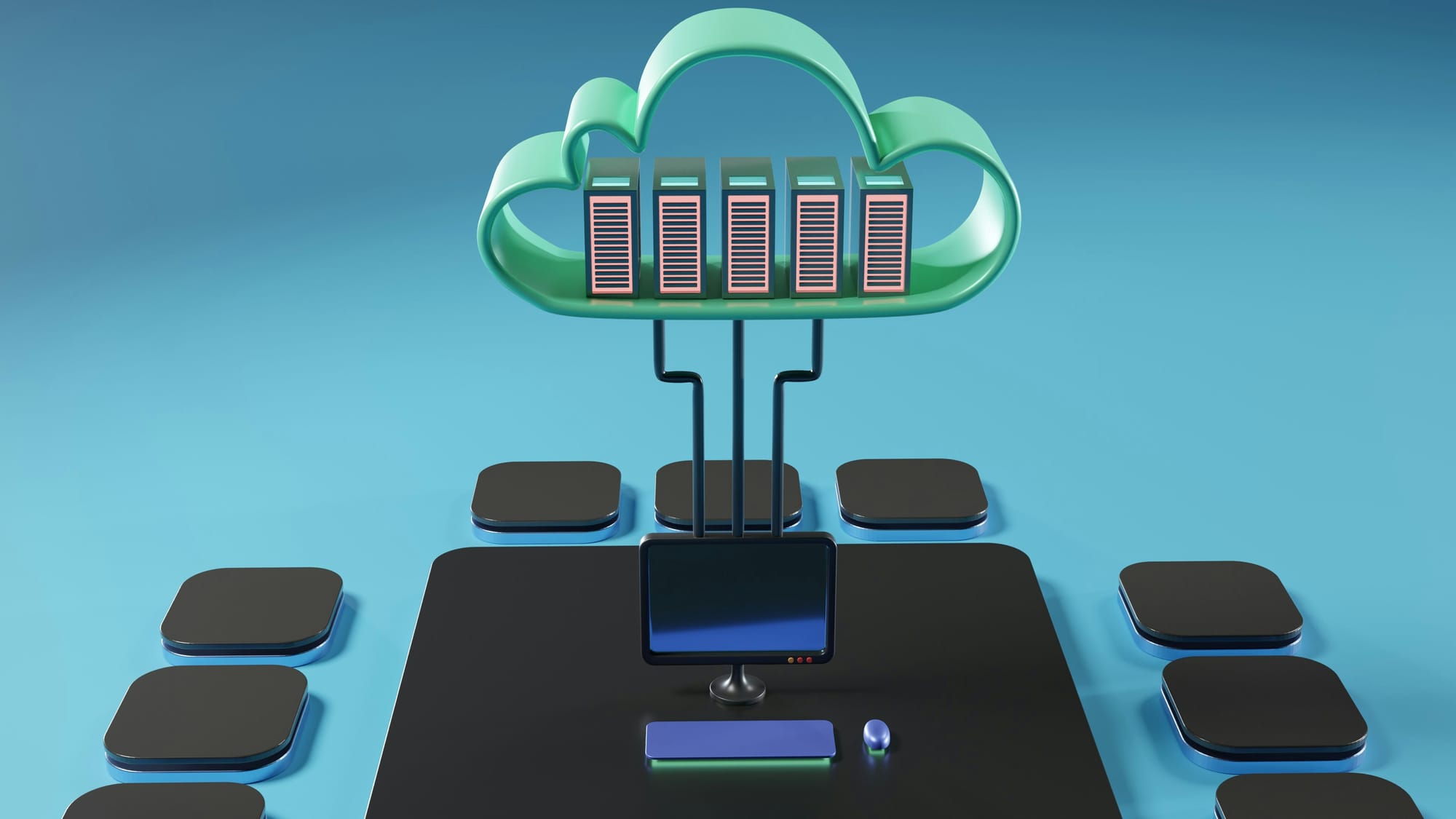The construction industry is undergoing a significant transformation, driven by the need for greater efficiency, streamlined operations, and enhanced project management capabilities.
This evolution is reflected in the booming construction ERP software market, which was valued at USD 13 billion in 2023.
With an impressive projected growth to USD 28 billion by 2030, at a compound annual growth rate (CAGR) of 14% during the forecast period 2024-2030, it's clear that construction companies are increasingly turning to advanced ERP solutions to stay competitive and manage their complex operations effectively. In this rapidly expanding market, selecting the right ERP software is crucial.
One notable ERP solution in this landscape is Deskera. Known for its user-friendly interface and comprehensive features, Deskera ERP integrates core business processes like financial management, inventory control, and HR management.
Its cloud-based accessibility, proactive customer support, and affordable pricing make it an excellent choice for construction companies of all sizes, enhancing productivity and profitability.
This guide highlights the top 10 construction ERP software solutions in 2024, offering insights into their key features, benefits, and why they stand out in the industry.
What is Construction ERP?
Construction ERP (Enterprise Resource Planning) is a specialized software system designed to streamline and integrate the various processes involved in managing construction projects and operations.
It serves as a unified platform to handle a wide range of functions essential to construction businesses, including project management, financial management, supply chain management, human resource management, and compliance.
Key Components of Construction ERP
Construction ERP systems encompass a wide range of features designed to address the specific needs of the construction industry. These key components integrate various functions, streamlining operations and improving efficiency.
Here are the essential components of a construction ERP system, using the relevant keywords:
1. Project Management
- Project Planning and Scheduling: ERP for construction offers tools for detailed project planning, scheduling tasks, and allocating resources to ensure timely project completion.
- Progress Tracking: Construction ERP software provides real-time tracking of project milestones, deadlines, and deliverables, helping managers stay on top of project progress.
- Document Management: Centralized storage and management of project-related documents, including blueprints, contracts, and reports.
2. Financial Management
- Accounting: ERP construction systems include modules for managing general ledger, accounts payable, accounts receivable, and payroll.
- Budgeting and Cost Control: Tools for creating and managing project budgets, tracking expenses, and controlling costs to prevent budget overruns.
- Financial Reporting: Comprehensive financial reports and analytics to monitor the financial health of projects and the overall business.
3. Supply Chain Management
- Procurement: Construction ERP integrations streamline the procurement process, managing purchase orders, vendor contracts, and supplier relationships.
- Inventory Management: Tracking and managing materials, equipment, and supplies to ensure timely availability and reduce waste.
- Logistics and Delivery: Coordinating the delivery and storage of materials to prevent delays and ensure project timelines are met.
4. Human Resource Management
- Recruitment and Onboarding: Managing the hiring process and onboarding new employees efficiently.
- Time and Attendance Tracking: Monitoring employee work hours, managing labor costs, and ensuring accurate payroll processing.
- Payroll Management: Handling wages, taxes, benefits, and other payroll-related tasks.
5. Customer Relationship Management (CRM)
- Client Management: Maintaining detailed records of client information and interactions.
- Sales and Contracts: Tracking leads, proposals, and contracts, and managing client relationships to enhance satisfaction and repeat business.
6. Compliance and Risk Management
- Regulatory Compliance: Ensuring adherence to industry regulations and standards to avoid legal issues.
- Safety Management: Tracking safety incidents, ensuring compliance with safety regulations, and implementing safety protocols.
- Risk Assessment and Mitigation: Identifying potential risks, assessing their impact, and developing mitigation strategies to protect project outcomes.
7. Business Intelligence and Analytics
- Data Analytics: Construction ERP software includes advanced analytics tools to analyze project data, financials, and operations.
- Real-Time Reporting: Providing real-time insights and reports to aid in decision-making and strategic planning.
- Performance Metrics: Tracking key performance indicators (KPIs) to monitor project and business performance.
8. Integration and Scalability
- Integration with Other Systems: Construction ERP integrations with other software systems, such as BIM (Building Information Modeling), IoT devices, and AI tools, to enhance functionality and innovation.
- Scalability: ERP for construction industry systems are designed to scale with the business, accommodating growth and increasing project complexity.
Importance of Construction ERP
The importance of construction ERP systems in the construction industry cannot be overstated. These systems provide a comprehensive solution for managing the complexities and dynamics of construction projects and operations.
Here are the key reasons highlighting the importance of Construction ERP:

1. Streamlined Project Management
- Centralized Planning and Scheduling: Construction ERP systems offer tools for detailed project planning and scheduling, helping manage timelines, resources, and milestones efficiently.
- Progress Tracking: Real-time tracking of project progress ensures that projects stay on schedule and any delays are promptly addressed.
2. Enhanced Financial Management
- Budget Control: Construction ERP software helps create accurate budgets and track expenses in real time, reducing the likelihood of cost overruns.
- Financial Reporting: Integrated financial management modules provide comprehensive reporting, giving a clear picture of financial health and project profitability.
3. Improved Resource Management
- Optimized Resource Allocation: ERP systems facilitate the efficient allocation and utilization of resources, including labor, materials, and equipment.
- Inventory Management: Better control over inventory helps in reducing waste, managing stock levels, and ensuring timely availability of materials.
4. Better Supply Chain Management
- Procurement Efficiency: Construction ERP software streamlines the procurement process, from vendor management to purchase orders and deliveries.
- Logistics Coordination: Ensures that materials and equipment are delivered on time, reducing project delays.
5. Integrated Data Management
- Unified Data Platform: ERP for construction integrates data across various functions, providing a single source of truth and eliminating data silos.
- Real-Time Information: Access to real-time data enhances decision-making and helps in proactive problem-solving.
6. Regulatory Compliance and Risk Management
- Compliance Tracking: Ensures adherence to industry regulations and standards, reducing the risk of legal issues.
- Risk Mitigation: Construction ERP systems help identify potential risks early and implement mitigation strategies, safeguarding project outcomes.
7. Enhanced Collaboration and Communication
- Stakeholder Coordination: Facilitates better communication and collaboration among project teams, contractors, suppliers, and clients.
- Document Management: Centralized document management ensures that all project-related documents are easily accessible and up-to-date.
8. Scalability and Flexibility
- Scalable Solutions: Construction ERP systems can scale with the business, accommodating growth and increasing project complexity without significant increases in overhead.
- Customization: ERP systems can be customized to meet the specific needs and workflows of a construction company, ensuring a better fit and higher efficiency.
9. Improved Client Relations
- Client Management: ERP systems include CRM modules that help manage client relationships, track project progress, and ensure timely communication.
- Customer Satisfaction: By delivering projects on time and within budget, construction ERP systems help enhance customer satisfaction and foster long-term relationships.
10. Technology Integration and Innovation
- Integration with Modern Technologies: Construction ERP systems often integrate with emerging technologies like IoT, AI, and BIM, driving innovation and improving operational efficiency.
- Continuous Improvement: By leveraging data and analytics, construction ERP systems support continuous improvement and help companies stay competitive in a rapidly evolving industry.
How ERP Systems Address Challenges and Unlock Opportunities in the Construction Industry
The construction industry faces numerous challenges that can be effectively addressed by implementing an ERP system. Construction ERP systems offer a comprehensive solution to streamline processes, improve efficiency, and enhance decision-making.
Here are the key challenges and opportunities in the construction industry that can be solved by construction ERP software.
Challenges Addressed by Construction ERP Systems
1.Project Management Complexity:
- Challenge: Managing multiple projects simultaneously with diverse requirements, schedules, and resources.
- Solution: ERP for construction provides integrated project management tools that streamline scheduling, resource allocation, and progress tracking, ensuring projects stay on track and within budget.
2.Cost Overruns:
- Challenge: Frequent budget overruns due to poor cost estimation, tracking, and control.
- Solution: Construction ERP software includes financial management modules that offer real-time cost tracking, budgeting, and forecasting, helping to control expenses and avoid overruns.
3.Fragmented Data:
- Challenge: Disparate systems and fragmented data hinder effective decision-making.
- Solution: ERP for construction industry integrates all data into a single platform, providing a unified view of project and business performance, enhancing data accuracy and accessibility.
4.Supply Chain Inefficiencies:
- Challenge: Delays and disruptions in the supply chain affecting project timelines.
- Solution: Construction ERP integrations with supply chain management modules streamline procurement, inventory management, and logistics, improving supply chain efficiency and reducing delays.
5.Regulatory Compliance:
- Challenge: Keeping up with ever-changing regulations and ensuring compliance.
- Solution: Construction ERP systems include compliance management features that help monitor and adhere to industry regulations, reducing the risk of non-compliance.
6.Human Resource Management:
- Challenge: Managing a large workforce with varying skills and schedules.
- Solution: ERP construction systems offer robust HR management modules for recruitment, time tracking, payroll processing, and performance management, ensuring effective workforce management.
Opportunities Enabled by Construction ERP Systems
1.Enhanced Collaboration:
- Opportunity: Improved communication and collaboration among stakeholders.
- Solution: ERP for construction integrates communication tools and document management systems, facilitating better collaboration among project teams, contractors, and clients.
2.Real-Time Analytics:
- Opportunity: Leveraging data for better decision-making.
- Solution: Construction ERP software provides real-time analytics and reporting, enabling managers to make informed decisions based on up-to-date data.
3.Scalability:
- Opportunity: Supporting business growth and scalability.
- Solution: ERP systems for the construction industry are scalable, allowing businesses to handle larger projects and expand operations without significant increases in overhead.
4.Improved Client Satisfaction:
- Opportunity: Enhancing client relationships and satisfaction.
- Solution: Construction ERP systems include CRM modules that help manage client interactions, track project status, and ensure timely delivery of projects, leading to improved client satisfaction.
5.Risk Management:
- Opportunity: Proactively managing risks to prevent project delays and failures.
- Solution: ERP construction systems offer risk management tools to identify potential risks, assess their impact, and implement mitigation strategies.
6.Innovation and Technology Integration:
- Opportunity: Adopting new technologies to stay competitive.
- Solution: Construction ERP integrations with emerging technologies like IoT, AI, and BIM (Building Information Modeling) enhance operational efficiency and innovation.
12 Essential Features To Look For In Construction ERP Software
When choosing an ERP system for the construction industry, it's crucial to ensure the software includes features that address the specific needs and challenges of construction projects. Here are the 12 key features to look for in Construction ERP software:
1. Comprehensive Project Management
- Project Planning and Scheduling: Ensure the ERP for construction offers detailed project planning and scheduling tools to manage timelines, tasks, and resources efficiently.
- Progress Tracking: Look for real-time tracking features that allow monitoring of project milestones, deadlines, and overall progress.
2. Robust Financial Management
- Budgeting and Cost Control: The construction ERP software should provide tools for creating and managing budgets, tracking expenses, and preventing cost overruns.
- Accounting: Ensure it includes modules for managing general ledger, accounts payable/receivable, and payroll to maintain financial health.
3. Efficient Supply Chain Management
- Procurement: Look for features that streamline the procurement process, including managing purchase orders, vendor contracts, and supplier relationships.
- Inventory Management: The ERP system should offer comprehensive inventory tracking to manage materials, equipment, and supplies effectively.
4. Advanced Human Resource Management
- Time and Attendance Tracking: Ensure the ERP construction system can monitor employee work hours and manage labor costs accurately.
- Payroll Management: Look for payroll processing capabilities that handle wages, taxes, and benefits efficiently.
5. Integrated Customer Relationship Management (CRM)
- Client Management: The ERP for the construction industry should maintain detailed records of client information and interactions.
- Sales and Contracts: Look for features that track leads, proposals, and contracts to manage client relationships and improve satisfaction.
6. Compliance and Risk Management
- Regulatory Compliance: The construction ERP software should help ensure adherence to industry regulations and standards.
- Risk Mitigation: Look for tools that identify potential risks, assess their impact, and develop strategies to mitigate them.
7. Business Intelligence and Analytics
- Real-Time Reporting: Ensure the ERP system provides real-time insights and reports to aid in decision-making.
- Data Analytics: Look for advanced analytics tools to analyze project data, financials, and operations, providing actionable insights.
8. Real-Time Visibility
- Live Data Access: Ensure the ERP construction system offers real-time visibility into all aspects of the business, allowing for timely and informed decision-making.
9. Detailed Reports
- Comprehensive Reporting: Look for ERP software that provides detailed and customizable reports on project performance, financials, and other critical metrics.
10. Seamless Integration and Scalability
- Integration with Other Systems: The construction ERP should easily integrate with other software solutions like BIM, IoT devices, and accounting systems.
- Scalability: Choose an ERP system that can scale with your business, accommodating growth and increasing project complexity without significant overhead.
11. Customizability to Suit Business Needs
- Tailored Solutions: Ensure the ERP for the construction industry can be customized to meet the unique workflows and requirements of your business.
12. Cloud-Based and Mobile Access
- Remote Accessibility: Look for cloud-based ERP solutions that offer mobile access, enabling teams to access information and collaborate from anywhere, anytime.
Choosing the Right ERP Software for Construction
Selecting the appropriate ERP software for the construction industry is pivotal for optimizing project management, financial control, and overall operational efficiency.
Here are key considerations to ensure you choose the best fit for your construction company:
1. Identify Your Key Challenges and Needs
- Does it Solve Your Key Problems?: Evaluate whether the Construction ERP software effectively addresses specific challenges inherent in construction projects, such as complex project management, regulatory compliance, or supply chain management.
- Fit for Your Workflows: Ensure the ERP for construction integrates seamlessly into your existing workflows and enhances operational efficiency without disruption.
2. Evaluate Benefits for Your Team
- User-Friendly Interface: Consider how intuitive the ERP construction software's interface is for various team members, including project managers, site supervisors, and accounting staff. Mobile accessibility can enhance usability and productivity.
- Training and Support: Assess the quality and availability of training and support provided by the ERP for construction industry vendor. Adequate training ensures smooth implementation and ongoing utilization.
3. Assess Cost and Return on Investment (ROI)
- Total Cost of Ownership: Beyond the initial purchase cost, consider ongoing maintenance, support fees, and any customization expenses associated with the Construction ERP system.
- ROI Potential: Evaluate the potential return on investment in terms of cost savings, efficiency improvements, reduced project delays, and enhanced resource management facilitated by the ERP construction software.
4. Scalability and Customizability
- Scalability: Determine if the ERP system for construction can scale alongside your business growth, accommodating larger projects and increased complexity.
- Customizability: Check the level of customization offered by the construction ERP software. It should adapt to your specific business needs and workflows, enhancing operational flexibility.
5. Integration Capabilities
- Seamless Integration: Verify how well the ERP construction system integrates with other essential tools and systems used in your business, such as BIM software, accounting systems, or project management tools.
- Data Accessibility: Ensure seamless data sharing across departments and real-time access to project information, facilitated by construction ERP integrations, promoting collaboration and informed decision-making.
6. Support for Compliance and Risk Management
- Compliance Features: Ensure the construction ERP software includes robust features to ensure compliance with industry regulations, such as safety standards and financial reporting requirements.
- Risk Management Tools: Evaluate the ERP's capabilities in identifying, assessing, and mitigating project risks, safeguarding project outcomes and minimizing disruptions.
7. Cloud-Based and Mobile Access
- Accessibility: Consider if the ERP software for construction is cloud-based and supports mobile access. This enables remote team members to access critical information from job sites, enhancing communication and decision-making.
- Security Measures: Ensure the ERP vendor implements robust security measures to protect sensitive project data stored in the cloud and accessed via mobile devices, maintaining data integrity.
Top 10 Construction ERP Software
The top 10 construction ERP software that you can consider implementing for enhancing operational efficiency are:
Deskera ERP

Deskera is a leading cloud-based ERP software provider that excels in integrating core business processes seamlessly. Tailored for organizations of all sizes and industries, Deskera ERP offers enterprise-level capabilities including financial management, material requirements planning, demand forecasting, work-in-progress (WIP) tracking, order management, HR management, by-product and scrap management, warehouse and inventory management, and real-time business intelligence.
One of Deskera ERP's standout features is its affordability coupled with proactive customer support. Implementing Deskera ERP can significantly enhance your competitive edge by streamlining business processes and boosting productivity and profitability.
Key Features of Deskera ERP:
- In-house Implementation Experts: Deskera provides in-house experts to ensure a smooth transition, successful implementation, and quicker go-live timelines for your ERP deployment.
- User-friendly and Customizable Interface: The ERP system offers a user-friendly interface with customizable dashboards tailored to meet your specific business requirements, reducing learning curves and enhancing usability.
- In-built Report Templates: Deskera ERP includes a variety of pre-designed report templates for quick and easy data analysis. These templates are customizable with your brand colors and logo, facilitating insightful business reporting.
- Mobile Accessibility: With mobile accessibility, Deskera ERP enables you to manage and access critical business data and processes on-the-go, enhancing flexibility and responsiveness.
- AI-Assistant David: The AI-assistant "David" automates routine tasks, assists in navigating through the ERP software, and provides real-time insights to support informed decision-making.
- Robust Security Measures: Deskera ERP ensures robust security measures to safeguard your data against cyber threats and unauthorized access, ensuring peace of mind for your business operations.
- Industry-Specific Functionality: Tailored modules for project management, procurement, subcontractor management, equipment tracking, and compliance.
- Scalability: Flexibly scales from small contractors to large firms, accommodating business growth.
- Integration Capabilities: Seamless integration with BIM software, scheduling tools, and payroll systems for streamlined operations.
- Real-Time Insights: Powerful analytics for instant project performance, financial health, and resource utilization insights.
- Cost-Effectiveness: Deskera offers an affordable pricing model that delivers significant return on investment by optimizing resources and reducing operational costs, making it a cost-effective choice for construction firms.
Limitations of Deskera ERP:
- It does not offer features for document management.
Microsoft Dynamics 365
Microsoft Dynamics 365 is a robust ERP solution that stands out for its comprehensive suite of business applications designed to streamline operations and drive growth across various industries, including construction.
This cloud-based ERP system integrates seamlessly with Microsoft's ecosystem, offering a unified platform for managing finances, operations, sales, customer service, and more.
Key Features of Microsoft Dynamics 365:
- Unified Platform: Dynamics 365 integrates ERP and CRM capabilities into a single platform, facilitating seamless data flow and enhancing collaboration across departments.
- Financial Management: Advanced financial management tools enable accurate budgeting, forecasting, and financial reporting, crucial for maintaining fiscal discipline in construction projects.
- Project Management: Robust project management capabilities allow construction firms to plan, execute, and monitor projects efficiently, with tools for resource allocation, scheduling, and cost tracking.
- Supply Chain Optimization: Dynamics 365 optimizes supply chain operations by integrating procurement, inventory management, and supplier relationships, ensuring timely delivery of materials and reducing project delays.
- Scalability and Flexibility: As a cloud-based solution, Dynamics 365 scales with your business needs, accommodating growth and adapting to evolving industry requirements.
Limitations of Microsoft Dynamics 365:
- It is complex, resulting in a steep learning curve.
- Its implementation costs are high.
To learn more about Deskera ERP vs. Microsoft Dynamics 365, click here.
SAP Business One
SAP Business One stands as a versatile ERP solution renowned for its ability to streamline operations and drive growth across diverse industries, including construction.
This robust system integrates seamlessly with SAP's ecosystem, offering a unified platform for managing finances, operations, customer relationships, and more.
Key Features of SAP Business One:
- Unified Platform: Integrates essential business functions such as financials, sales, CRM, inventory, and operations into a single platform, providing a unified view of business processes.
- Financial Management: Advanced tools for financial accounting, budgeting, banking, and financial reporting ensure accurate and transparent financial management.
- Sales and Customer Relationship Management (CRM): Manages the entire sales process from lead to order to delivery. Includes features for managing customer information, sales opportunities, and service contracts.
- Inventory and Distribution: Tracks inventory levels in real-time across multiple warehouses. Manages item master data, pricing, special pricing agreements, and procurement processes.
- Purchasing and Procurement: Streamlines procurement processes with automated purchase orders, vendor management, and purchase planning based on real-time inventory data.
Limitations of SAP Business One:
- Depending on the region and local support infrastructure, accessing timely support and updates for SAP Business One can vary. This could impact the speed of issue resolution or the availability of new features.
To learn more about Deskera ERP vs. SAP Business One, click here.
Sage 300
Sage 300 stands out as a robust alternative for businesses seeking to streamline operations and enhance efficiency across various sectors, including construction.
Known for its user-friendly interface and extensive feature set, Sage ERP offers tailored solutions that integrate seamlessly with existing business processes.
Key Features of Sage:
- High Customizability: Sage ERP provides extensive customization options with various coding capabilities, allowing construction firms to adapt the system to meet specific business needs and workflows effectively.
- Real-Time Financial Management: The ERP system ensures access to real-time financial management data, empowering stakeholders to make informed decisions swiftly based on up-to-date financial insights.
- Comprehensive Project Management: Sage ERP excels in project management by integrating tools for cost monitoring, schedule tracking, resource allocation, and subcontractor management, thereby optimizing project efficiency and profitability.
- Inventory and Supply Chain Management: Tracks inventory levels, manages warehouses, and optimizes supply chain processes to ensure efficient procurement and timely delivery of materials.
Limitation of Sage:
- The mobile application of Sage ERP may have limited functionalities compared to the desktop version, potentially restricting remote accessibility and real-time updates for field operations.
- Implementing Sage ERP can involve complexity and significant initial costs, particularly for smaller construction firms with limited IT resources. Ongoing maintenance and customization may also contribute to total cost considerations.
To learn more about Deskera ERP vs. Sage, click here.
Acumatica
Acumatica offers a comprehensive ERP software solution designed to optimize construction management by combining robust business intelligence with practical functionality. Whether overseeing projects on-site or in the office, Acumatica ensures seamless project execution and enhanced decision-making processes.
Key Features of Acumatica:
- Real-time, Role-Based Dashboards: Accessible from any device, Acumatica provides instant data access through customizable dashboards, empowering stakeholders with up-to-date project insights and metrics.
- Modules for Comprehensive Management: Covers essential areas such as financials, payroll, inventory management, and project management, ensuring holistic management of construction operations from start to finish.
- Scalability: Acumatica scales seamlessly as your construction business grows, adapting to increasing project complexities and organizational needs without compromising performance.
- Accessibility and Remote Work: Supports remote work scenarios by enabling access from any device with internet connectivity, facilitating collaboration and productivity across distributed project teams.
- Integration Capabilities: Integrates smoothly with existing systems and third-party applications, enhancing data flow and operational efficiency throughout the construction lifecycle.
Limitations of Acumatica:
- Lacks some basic reporting features compared to other ERP solutions, potentially requiring customization or integration with additional reporting tools for specific analytical needs.
- It relies on external partners for implementation, which leads to varying experiences based on the partner's skills and expertise. This makes transition challenging.
To learn more about Deskera ERP vs. Acumatica, click here.
Epicor
Epicor offers a versatile ERP solution tailored to the needs of construction companies, providing a suite of tools designed to streamline operations, enhance project management, and drive business growth.
Known for its robust functionality and industry-specific features, Epicor ensures that construction projects are executed efficiently and effectively.
Key Features of Epicor:
- Project Management: Provides comprehensive project management tools that allow for detailed project planning, scheduling, resource allocation, and tracking. This ensures projects are completed on time and within budget.
- Financial Management: Advanced financial modules offer capabilities for budgeting, forecasting, financial reporting, and cash flow management, helping construction companies maintain financial control and transparency.
- Supply Chain Management: Optimizes the supply chain by integrating procurement, inventory management, and supplier relationships. This ensures timely delivery of materials and efficient management of construction resources.
- Business Intelligence: Built-in analytics and reporting tools provide real-time insights into project performance, financial health, and resource utilization. This empowers informed decision-making and proactive management.
- Scalability: Epicor is designed to grow with your business, offering scalability to accommodate expanding operations and increasing project complexity.
Limitations of Epicor:
- The implementation process can be complex and time-consuming, requiring significant planning and expertise to ensure a successful deployment.
- Epicor has 11 separate platforms that do not work together smoothly because they are built on different codes.
To learn more about Deskera ERP vs. Epicor, click here.
NetSuite
NetSuite is a leading cloud-based ERP solution that offers construction companies a comprehensive suite of tools designed to streamline operations, enhance project management, and drive business growth.
Renowned for its flexibility and scalability, NetSuite ensures construction projects are managed efficiently from inception to completion.
Key Features of NetSuite:
- Project Management: Provides robust tools for project planning, scheduling, resource allocation, and tracking. This ensures projects are delivered on time, within budget, and to the highest quality standards.
- Financial Management: Advanced financial management capabilities include budgeting, forecasting, financial reporting, and cash flow management. These tools help maintain financial control and ensure project profitability.
- Supply Chain Management: Optimizes supply chain operations by integrating procurement, inventory management, and vendor relationships. This ensures timely material deliveries and reduces the risk of project delays.
- Business Intelligence: Built-in analytics and reporting features offer real-time insights into project performance, financial status, and resource utilization. These capabilities support informed decision-making and proactive management.
- Cloud-Based Accessibility: As a cloud-based solution, NetSuite allows access to critical business data and processes from anywhere with an internet connection. This supports remote work and enhances collaboration across project teams.
- Scalability: NetSuite is designed to scale with your business, accommodating growth and adapting to evolving industry requirements. It supports expanding operations and increasing project complexity seamlessly.
Limitations of NetSuite:
- Although NetSuite is highly flexible, extensive customization to meet specific business needs can be complex and resource-intensive, requiring adequate IT support.
- New users may face a learning curve due to the system's comprehensive functionality. Proper training and support are necessary to ensure users can effectively leverage the system's capabilities.
To learn more about Deskera ERP vs. NetSuite, click here.
Odoo
Odoo is an open-source ERP solution that offers a flexible and comprehensive suite of applications designed to streamline operations and enhance efficiency in various industries, including construction.
Known for its modular approach, Odoo provides construction companies with the tools they need to manage projects, finances, and operations effectively.
Key Features of Odoo:
- Project Management: Offers robust tools for planning, scheduling, resource allocation, and tracking. This ensures that construction projects are managed efficiently, completed on time, and within budget.
- Financial Management: Advanced financial management capabilities include budgeting, accounting, invoicing, and financial reporting. These tools help maintain financial control and transparency across all projects.
- Inventory and Supply Chain Management: Optimizes inventory levels and supply chain operations by integrating procurement, inventory management, and supplier relationships. This ensures timely delivery of materials and reduces project delays.
- Modular Architecture: Odoo’s modular design allows businesses to start with the essential applications and add more as needed. This flexibility enables construction companies to customize their ERP system to fit their specific requirements.
- Integration Capabilities: Seamlessly integrates with other systems and third-party applications, ensuring a cohesive and streamlined operational environment.
- Cloud-Based and On-Premise Options: Offers both cloud-based and on-premise deployment options, providing flexibility based on your business’s infrastructure and preferences.
Limitations of Odoo:
- As an open-source solution, Odoo’s user support may vary based on the community and available resources. Businesses may need to invest in professional support services to ensure reliable assistance.
- The initial setup and configuration of Odoo can be complex, especially for businesses without prior ERP experience. Adequate planning and training are essential to ensure a smooth implementation.
To learn more about Deskera ERP vs. Odoo, click here.
Infor
Infor offers a robust ERP solution tailored specifically to meet the complex needs of the construction industry.
Known for its deep industry functionality and flexible deployment options, Infor provides construction companies with a suite of integrated applications designed to streamline operations, enhance project management, and drive business growth.
Key Features of Infor:
- Project Management: Provides comprehensive tools for project planning, scheduling, resource allocation, and tracking. This ensures projects are managed efficiently, completed on time, and within budget.
- Financial Management: Advanced financial management capabilities include budgeting, accounting, financial reporting, and cash flow management. These tools help maintain financial control and transparency across all projects.
- Supply Chain Management: Optimizes supply chain operations by integrating procurement, inventory management, and supplier relationships. This ensures timely delivery of materials and reduces the risk of project delays.
- Human Capital Management: Manages workforce data, payroll, benefits administration, and compliance with HR regulations, ensuring efficient management of construction personnel.
- Integration Capabilities: Seamlessly integrates with other systems and third-party applications, enhancing data flow and operational efficiency throughout the construction lifecycle.
Limitations of Infor:
- The initial and ongoing costs associated with Infor can be high, particularly for small to mid-sized construction firms. This includes expenses for software licenses, customization, training, and maintenance.
- While Infor is highly customizable, extensive customization to meet specific business needs can be resource-intensive and may require technical expertise.
To learn more about Deskera ERP vs. Infor, click here.
Fishbowl
Fishbowl offers a robust inventory management and manufacturing ERP solution designed to meet the needs of small to mid-sized construction companies.
Known for its user-friendly interface and seamless integration capabilities, Fishbowl provides essential tools to streamline operations, manage inventory, and enhance overall efficiency in construction management.
Key Features of Fishbowl:
- Inventory Management: Provides comprehensive tools for tracking inventory levels, managing warehouses, and automating reorder points. This ensures that construction materials are available when needed, reducing project delays.
- Manufacturing and Production Management: Supports manufacturing processes with features for bill of materials (BOM), work orders, and production scheduling. This helps construction companies manage prefabricated components and on-site production efficiently.
- Order Management: Streamlines order processing from start to finish, including sales orders, purchase orders, and shipping. This enhances coordination between different departments and improves customer satisfaction.
- Integration Capabilities: Integrates seamlessly with popular accounting software like QuickBooks, as well as other third-party applications. This ensures smooth data flow and operational efficiency across all business functions.
- Cost Tracking: Tracks costs associated with inventory, labor, and manufacturing, providing detailed insights into project expenses. This helps in maintaining budgetary control and optimizing resource allocation.
Limitations of Fishbowl:
- Fishbowl may lack some advanced ERP features found in more comprehensive solutions, such as detailed financial management, advanced project management, and extensive CRM capabilities.
- Fishbowl is best suited for small to mid-sized businesses. Larger construction companies with more complex operations may find that it does not scale as effectively as other ERP solutions.
To learn more about Deskera ERP vs. Fishbowl, click here.
Key Takeaways
In a rapidly evolving construction industry, selecting the right ERP software is crucial for maintaining competitive advantage and operational efficiency. The key takeaways for the above article are:
1.Market Growth: The Construction ERP Software Market, valued at USD 13 billion in 2023, is expected to reach USD 28 billion by 2030, growing at a CAGR of 14% during 2024-2030. This growth underscores the increasing reliance on ERP solutions to enhance efficiency and project management in the construction industry.
2.Challenges and Opportunities Solved by ERP:
- Challenges: Managing complex projects, ensuring real-time collaboration, handling financial management, and integrating various business processes.
- Opportunities: Streamlining operations, improving decision-making with real-time data, enhancing financial control, and optimizing resource management through construction ERP systems.
3.Importance of Construction ERP:
- Construction ERP software is vital for improving project efficiency, reducing costs, and ensuring timely delivery of projects. It also enhances collaboration across departments, leading to better project outcomes.
4.Key Features to Look for in Construction ERP Software:
- Real-time Visibility: Provides up-to-date information on project status and resource allocation.
- Detailed Reports: Facilitates quick and easy data analysis for informed decision-making.
- Seamless Integration and Scalability: Ensures smooth data flow between different systems and can scale with business growth.
- Customizability: Allows tailoring of the software to meet specific business needs.
- Cloud-based and Mobile Access: Enables access to critical business data from anywhere, supporting remote work and field operations.
5.Top Solutions: Leading ERP solutions for construction in 2024 include Deskera, Microsoft Dynamics 365, SAP Business One, Sage, Acumatica, Epicor, NetSuite, Odoo, Infor, and Fishbowl. Each offers unique features tailored to streamline construction operations.
6.Deskera: Stands out for its user-friendly interface, comprehensive feature set including financial management and HR, cloud-based accessibility, and its in-house implementation experts guarantee a smooth transition and successful deployment. This makes it a top choice for businesses of all sizes.
Related Articles












